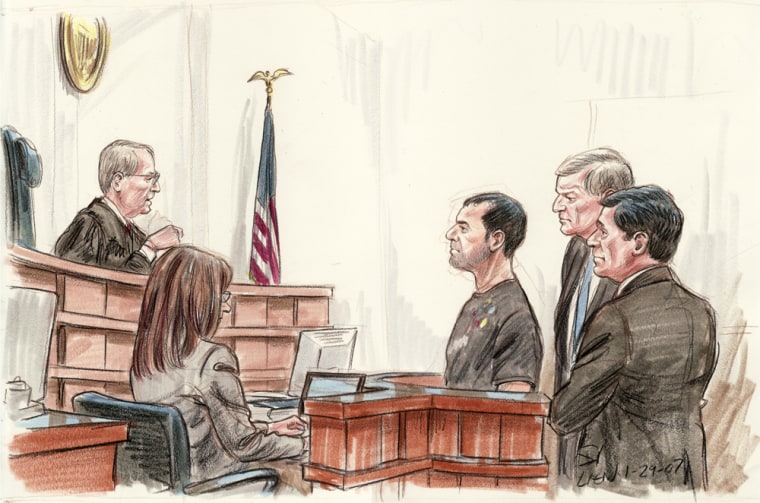An Iraqi-born Dutch citizen pleaded not guilty Monday in what the Justice Department called the first U.S. terror charges against insurgents targeting Americans in Iraq.
Wesam al-Delaema, 33, has been wanted by the United States since 2003, when he and his fellow "Mujahideen from Fallujah" videotaped themselves planting explosives along an Iraq road used by U.S. troops. The explosives did not result in any deaths.
He was extradited from the Netherlands over the weekend after being held there for nearly two years, and will become the first suspect tried in a U.S. court for alleged terrorism in Iraq's bloody insurgency.
"After a lengthy extradition process, this defendant will now face justice for his efforts in orchestrating and launching roadside bomb attacks against our men and women serving in Iraq," Assistant Attorney General Kenneth Wainstein said Monday.
Al-Delaema has claimed he is innocent, and his lawyers have argued the U.S. does not have the right to try him. He nodded his head and spoke in broken English with his attorneys during a 10-minute hearing in front of U.S. District Judge Paul Friedman in Washington. Prosecutor Gregg Maisel said the government would be seeking hair and saliva samples from al-Delaema, which the Justice Department said could link him to the crimes.
Federal, not military court
As part of the extradition agreement with the Netherlands, Justice Department spokesman Dean Boyd said that al-Delaema will be tried in a federal court — not by a military commission such as those set up for terror suspects being held at Guantanamo Bay, Cuba. The U.S. will also not oppose al-Delaema serving his sentence in a Dutch prison if he is convicted, Boyd said.
Al-Delaema's attorney, Victor Koppe, had argued that he feared al-Delaema could be tortured by U.S. authorities and said the U.S. legal system couldn't be trusted.
Al-Delaema traveled to Iraq after the U.S.-led invasion. Evidence against him includes a videotape he filmed of a group called "Warriors of Fallujah" preparing a roadside bomb, which was widely shown on Arabic TV stations. The tape was seized by police who raided al-Delaema's house in the Dutch city of Amersfoort in May 2005 following a tip from U.S. authorities.
Suspect says he was forced
In extradition hearings in the Netherlands, al-Delaema argued that he was forced to make the video after being kidnapped and beaten. He said he feared being beheaded if he resisted.
In a 2003 interview broadcast on Dutch television, al-Delaema accused the U.S. and its allies of waging war in Iraq to control its oil reserves.
"The Americans and British are coming to our country to steal oil and everyone knows it," he said.
"I don't care if I myself die or not. I want to offer myself up for my land, for my people. I'm not more or less important than the women and children who you see on television dying because of America," al-Delaema said.
His family said the interview was intended as a joke.
